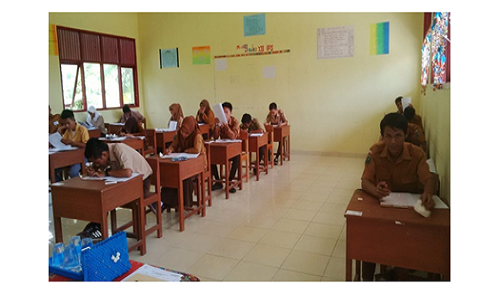
The Influence of Emotional Intelligence and Student Learning Behavior Through Student Motivation on Student Learning Outcomes
Abstract
Learning outcomes are a description on how students understand the material presented by the teacher. Learning outcomes are output values in the form of numbers or letters obtained by students after receiving learning material through a test or exam delivered by the teacher. This study aims to determine the effect of emotional intelligence, learning behavior, motivation on learning outcomes either simultaneously or partially. The method used in this research is descriptive method. Based on the data analysis and hypothesis testing that has been carried out in this study, the results of the research show that there is an influence of Emotional Intelligence and Learning Behavior on Motivation with a t-count of 5,912 emotional intelligence on motivation and learning behavior with a bear t count of 4.408 thus it can It is known that emotional intelligence and learning behavior affect learning motivation. The conclusions are as follows: 1) The influence of Emotional Intelligence and Learning Behavior on Motivation. 2) The influence of Emotional Intelligence and Learning Behavior, Motivation on student learning outcomes.
Keywords
Full Text:
PDFReferences
Arifin, Z. (2009). Evaluasi pembelajaran. Bandung: PT Remaja Rosdakarya.
Dimyati, & Mudjiono. (2015). Belajar dan Pembelajaran. Jakarta: Rieneke Cipta.
Nugrahadi, E. W. (2018). Pengaruh Kecerdasan Emosional Dan Motivasi Belajar Terhadap Prestasi Belajar Ekonomi Siswa Kelas X IIS Sma Negeri 1 Raya Tahun Pelajaran 2017/2018. Jurnal Ekonomi Pendidikan, 8 (6), 1-18.
Fanikmah, D. (2016). Pengaruh Kecerdasan Emosional dan Minat Belajar Terhadap Tingkat Pemahaman Akuntansi. Jurnal Ilmu dan Riset Akuntansi, 5 (7), 1-16.
Fathurrohman, I. (2018). Pengaruh Komunikasi Interpersonal Guru dengan siswa Terhadap Perilaku Belajar Siswa dalam Mewujudkan Prestasi Belajar Siswa. Khazanah Akademia, 2(2), 13-21.
Hanum, F. (2015). Kontribusi minat belajar dan E- learning sebagai media pembelajaran terhadap hasil belajar siswa kelas X jurusan teknik computer dan jaringan SMK Negeri 1 Air Putih di kabupaten Batubara Sumatera Utara . Jurnal Vokasional Teknik Elektronika dan Informatika, 3(1), 75-88.
Hamzah, B. U. (2012). Teori motivasi dan pengukurannya. Jakarta: Bumi Aksara.
Kalsum, M. (2017). Penggunaan Metode Pembelajaran dalam Peningkatan Hasil Belajar Siswa. Studia Didaktika : Jurnal Ilmiah Bidang Pendidikan, 11 (1), 9-16.
Kunandar. (2013). Penilaian Autentik (Penilaian hasil belajar peserta didik berdasarkan kurikulum). Jakarta: Rajagrafindo.
Mardiana, N. (2012). Upaya Guru Meningkatkan Perilaku Belajar Siswa Mata Pelajaran IPS Terpadu di SMP. Jurnal Pendidikan dan Pembelajaran Khatulistiwa, 1(1), 3-9.
Marina. (2019). Penerapan Model Pembelajaran Kelas Bergerak dan Kompetensi Pedagogik Guru dalam Pembelajaran Motivasi dan Disiplin Belajar Siswa. Journal of Educational Sciences, 3(1), 72-83.
Hamalik, O. (2012). Psikologi Belajar dan Mengajar. Bandung: PT. Sinar Baru Algensindo.
Purwanto. (2011). Evaluasi Hasil Belajar. Yogyakarta: Pustaka Pelajar.
Putri, K., & Sutrisno, D. (2017). Pengaruh Minat Belajar dan Kecerdasan Emosional Terhadap Prestasi Belajar Siswa Kelas XI IPS SMA Negeri 1 Prajekan Kabupaten Bondowoso Tahun Ajaran 2016/2017. Jurnal Pendidikan Ekonomi: Jurnal Ilmiah Ilmu Pendidikan, Ilmu Ekonomi, dan Ilmu Sosial, 11(2), 61-68.
Sugiyono. (2011). Metode Penelitian Kuantitatif Kualitatif dan R&D. Bandung: Alpa Beta.
Walgito, B. (2010). Pengantar Psikologi Umum. Yogyakarta: Penerbit Andi Yudhawati, Ratna dan Dany Haryanto.
Yahya, M. (2020). Pengaruh Kecerdasan Intelektual, Emosional, Dan Spiritual Terhadap Perekonomian Prestasi Belajar SMA Negeri 1 Soppeng. Jurnal Pendidikan Ekonomi, 13 (1 ), 50-60.
DOI: http://dx.doi.org/10.31258/jes.4.4.p.881-889
Refbacks
- There are currently no refbacks.
Copyright (c) 2020 Abdul Rauf, Suarman Suarman, Sri Kartikowati

This work is licensed under a Creative Commons Attribution 4.0 International License.
Publisher: FKIP Universitas Riau












